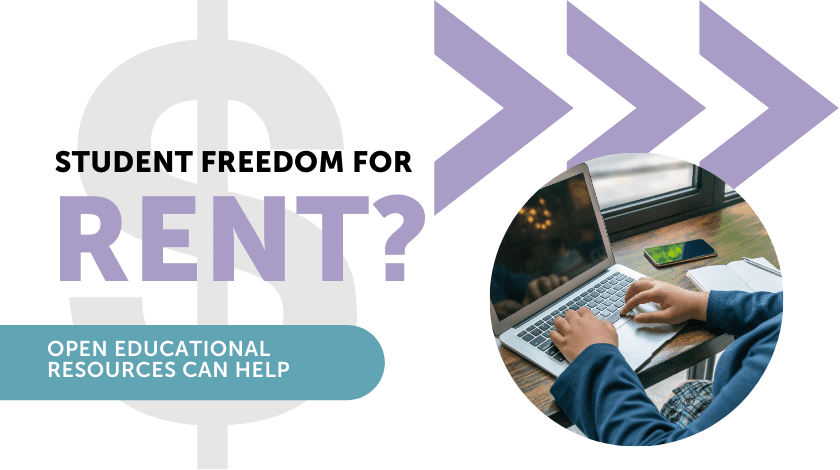News and Announcements
Student Freedom For Rent: Open Educational Resources Can Help
Published Date
- May 9, 2023

By Cailyn Nagle
I do not own my home—like most of Los Angeles, I rent. Every month, a significant portion of my paycheck goes to strangers I’ve never met to keep a roof over my head and a lock on my door. There are benefits, of course, such as not needing to arrange for repairs, the ease of being able to pick up and move, and no property tax forms. The cost is less control over my living space, sacrificing privacy, and forgoing long-term wealth. For many Angelenos and Americans, renting is not a choice—it is simply what we can afford. Most people don’t want to be renters forever, myself included, so why are we allowing giant corporations to turn us into tenants in every corner of our lives?
Across the country, college spring terms are ending. When I was a student, this meant I would have made my way to one of the many college bookstores to sell back most of my books and select a few to keep. That experience is largely gone; instead of books, students are assigned passwords to access their materials, which simply expire and permanently shut off the student’s access to the digital textbooks they now rent. These digital textbook rentals certainly have advantages—they are priced significantly cheaper than print copies and backpacks are absolutely lighter—but at what cost?
More and more often, we do not fully own the products we pay for— we rent them. This means we cannot fully control these products, and what we cannot control we cannot repair, resell, customize, or fully and freely use.
Textbooks, Car Seat Heaters, and Tractors: the Tenant-ification of Our Lives
Last July, BMW announced they would start offering heated car seats for $18 a month. Every car will be equipped with the feature, but owners will pay extra for someone in the BMW headquarters to flip the switch and toast their behinds. Car seat heaters are neat, but they are hardly a necessity—imagine paying extra to roll down the windows or to use the radio.
This is not just a problem for luxury car owners. John Deere, Medtronic, and other equipment manufacturers are restricting the ability of customers to repair the tools they need to maintain their livelihoods, and in some cases, patients’ lives. During the height of the COVID-19 pandemic, medical devices, such as respirators, were pushed to the limit. While hospitals employed skilled technicians to repair and maintain these machines, medical device manufacturers refused to provide repair manuals to healthcare institutions. As a result, hospitals were forced to take needed machines out of commission as they awaited lengthy repairs from the manufacturers. A tool that cannot be repaired by its purchaser is not truly owned by that customer—in the field of medicine during a crisis, a lack of control has dire consequences.
On a farm, when a tractor breaks down in the middle of a harvest the farmer does not have time to wait on transporting their thousand-ton piece of equipment to a “certified dealer” for repair. Yet, with the software used in equipment, many farmers need to do just that, gambling with their entire crop on the line. Recently, farmers in Colorado have successfully pushed back on this, but in higher education, the lines are still being drawn.
The Promise of Open
While the impact in other sectors is more direct, what happens when we turn the transformative force that is education into a series of check boxes and tests? Large corporations are able to offer quick, and often high quality, products to meet the immediate needs of a stretched higher education system.
It is valuable, though, to ask what the loss of control costs. If faculty are no longer designing or grading the homework problems, they gain time. If students choose the $100 homework and textbook digital rental over the $295 print copy, they save money. When these students are assigned courseware with the homework bundled into the digital book that they will lose access to at the end of the term, they are forced to become renters of their necessary materials and faculty are pushed to forfeit ownership of their assignments. When educational materials are taken from the control of instructors and students, our campuses take another step away from their core mission and toward the constant march of commodification of what should be a public good.
Open educational resources (OER)—materials written and released under an open copyright license, allowing educators and students to retain, customize, share, and remix materials—rose to prominence in the shadow of a steep rise in textbook costs at the turn of the 2000s. While the steep rise in costs have leveled off, another threat has emerged: Students and educators are losing control of the tools they need. The promise of open is in direct opposition to the expanding enclosures of the for-profit publishers of course materials. Through OER, educators can regain control over the tools of their work and students can retain the materials they need free of cost.
Once something is shared freely and wholly, in the way that open educational resources are, the cycle of rent extraction becomes broken and we all become a little more free.
Michelson 20MM is a private, nonprofit foundation seeking to accelerate progress towards a more just world through grantmaking, operating programs, and impact investing. Co-chaired and funded by Alya and Gary Michelson, Michelson 20MM is part of the Michelson Philanthropies network of foundations.
To sign up for our newsletter, click here.